Ghost Trapper 14 Midnight Movie Read online
Page 8
“But did Chance and Adaire date?”
“Yes, when they made Hotel Island. He had a lead role, she had a bit part. Then they co-starred in Pocketful of Aces the following year, but their careers diverged from there. She went on to make critically acclaimed films like A Soldier’s Dame and Legend of the South. He never really broke out of the hardboiled stuff—The Nightingale Job, Bootlegger Boulevard. If Chance Chadwick hadn’t died in a spectacular crash, he might have faded away altogether. I think his last movie was The Chicago Hustle, two years before he died. That was a long time for a leading man to go without a film in those days.”
“I thought you were focusing on Adaire Fontaine.”
“I’m reading about both of them. Plus, this is mostly common knowledge. At least for film-school dorks.”
“Good thing you’re one of those,” I said. “What else do we know about Chadwick’s death? Was anyone else in the car with him?”
“A Spanish fashion model named Julia Garza, who he’d been dating for about a week. They were heading to his house in Malibu but never made it.”
“Was he driving under the influence?”
“It’s possible. By 1950s California standards, anything less than half a bottle of hard liquor was probably considered fine.”
“Was there any suspicion he was murdered?”
“The consensus seemed to be reckless daredevilry.”
“And his after-death punishment for that was to spend eternity at a drive-in?” I asked. “Seems excessive. It looks like the only possible connection between Stanley Preston and Chance Chadwick would be through Adaire Fontaine. Did they suspect anyone else in Adaire’s murder besides the director?”
“Antonio Mazzanti was always the prime suspect. She was murdered at home, with no sign of a break-in. She’d walked off the set of House of Gold, a very expensive period piece about the de Medici family, wrecking Mazzanti’s work and breaking up with him all once.”
“That’s some spicy gossip,” I said. “With piles of obvious motivation.”
“There were other suspects, generally romantic rivals, the significant others of those she was rumored to have had affairs with, and like I said, there were many rumors on that front. Mazzanti was investigated but never arrested. He never completed the de Medici movie either. His movies after that tended to be shoddy and low budget. Major studios and actors didn’t want to work with him because of the suspicion. And then he went on to commit at least two other murders.”
I nodded. “We’d better get moving if we want to set up the camera down in the old projection house before dark.”
“Which we definitely do. I’m not going in there after dark.”
We left the restaurant and split up to claim our individual vehicles.
As I drove the van out to the drive-in, I called Calvin down in Florida.
“The Nite-Lite Drive-In?” He chuckled after I told him about our case. “I frequented it in high school. My ex-wife and I went there a few times. I don’t think we ever took Lori. The place was seedy by then. Didn’t show decent movies anymore. I’m surprised it’s still open.”
“Our clients are trying to reopen it—in a non-seedy way with decent movies—but they’ve got a paranormal pest problem. Something keeps running off their customers, and they can’t afford to lose any. I’d love any police or medical examiner reports on the deaths in that family.”
“You know who to call downtown.”
“Yes, but they always move faster for you. I must lack gravitas.”
“That’s something you could develop.”
“I’ll put it on my to-do list. Most of the drive-in owner’s family members died locally, but the stepson was out in Louisiana. That could make things less zippy. Though I have no sign the son is haunting the drive-in. The owner was a struggling local stage actor named Stanley Preston. Ring any bells?”
“We didn’t attend a lot of plays. Grant Patterson is your man to call for that.”
“He’s next.” I finished our call as I reached the theater.
Stacey and I parked in the third row, our vehicles flanking the low pillbox of the old projection house. If that sunken, partially underground space was indeed the ghost’s lair, we wanted to make sure it encountered us first when it came out, rather than any customers who might show up later.
Callie jogged out from the screen tower, plainly distressed, her hair loose and flying everywhere, dark bags under her eyes. She wore tennis shoes and pajamas. Her dog followed on a long leash.
“Hey,” she said as we stepped out. “So, there was an incident.”
“Is everybody okay?”
“Daisy was scared. She kept saying she could hear someone walking around on the third floor, above her room. Gumby was acting weird, too, whining and looking up at the ceiling.
“Benny went up to the third floor—there’s all kinds of junk up there, and he expected to find a squirrel or a rat. Instead, he saw a man. A shadow. It wasn’t moving, and it disappeared when he turned on the light. But… he smelled cigar smoke.”
“Sounds like our parking lot phantom is widening his territory,” I said.
“I didn’t smell it when I went up there,” she said. “Benny didn’t tell me about what he saw until after the sun was up and Daisy was back asleep.”
“That’s awful,” Stacey said. “Sorry to hear it.”
“We’ll definitely check out the third floor.” I looked up at the screen tower, where the late afternoon light glowed orange.
“Listen, I hate to ask, and it’s totally fine to say no, and Benny didn’t even think I should ask, but is there any chance y’all can accept partial pay in food? Because it would be easier on us—”
“Yes, please!” Stacey said. “More pizzas!”
“There’s other stuff, obviously,” Callie told me. “Salad greens, some vegetables from the garden. It’s not like I want my family eating junk food every day.”
“That works for me,” I said, feeling bad for her, but also remembering the exquisite gourmet pizzas. If only charity always tasted so good. “This case might take a while. We have a lot of open questions about who is haunting this place and why.”
“Plus, your cheffing is exquisite,” Stacey said.
“Thanks.” Callie blushed, as if her culinary skill was somehow news to her.
“I’ll take movie tickets, too, personally,” Stacey said. “Gift certificates. I really want to see this place happen.”
“That would be a relief,” Callie said with a relieved smile. “Thank you. Seriously. I’m sorry.”
I was a little more dubious about getting paid in movie tickets, but Stacey could do what she wanted. We’d certainly worked for little to nothing before. If the client seemed to be in danger, we’d take the case without much regard for their ability to pay, even if our overdue accounts receivable stack couldn’t handle much more. That was my boss’s long-established practice, and I was happy to uphold it. Well, maybe not “happy,” but I couldn’t just leave people at the mercy of the dead.
I saw signs of trouble in this small family, too, a lot of strain and tension, even as they put up a cheerful front for strangers. They were exhausted.
Callie’s talents were almost wasted out here at the drive-in, I thought. Unless the drive-in proved successful, in which case, great for them. It's nice when people’s dreams come true. So far, though, with Cigar Man haunting the parking lot and weird ghost-movie apparitions on the screen, the place was more of a nightmare.
“We’ll get started,” I nodded at the sunken projection booth. “We’ll be out of the way before all the customers show up, I promise.”
“Oh, sure, before we get flooded with all the customers.” She shook her head and headed away toward the Purple Pizza Eater.
Stacey and I opened the van and got to work, hurrying before the sun went down.
I sat on the ground in front of the too-short door to the sunken projection house, shoved it open, and peered into the earthy darkness. Reluctantly
, I wriggled down inside and dropped to the floor, my boots crunching in damp, sandy earth atop the uneven bricks of the floor.
“This place is a kill box,” I said, pointing my flashlight into dark corners. There was no electricity—Benny had assured me the loose, dangling wires were attached to nothing. “There’s no getting out of here fast.”
“Well, great, I look forward to it.” Stacey passed me down the tripod, the thermal camera, and the other monitoring gear, then sat down and scooted inside to join me. She landed nimbly on the floor beside me, though it was an unpleasantly long drop. I didn’t look forward to climbing back out.
Our flashlight beams moved across brick walls slick with dampness that wept in from the surrounding soil. Metal shelves held bric-a-brac, rusty hand tools, and spare parts for servicing the projector.
Stacey approached the mechanical monster of the antique projector itself, like a slumbering dragon in its lair, but surrounded by useless junk instead of treasure. The stump of the second projector beside it lay in ruins, the years having been less kind to it.
Movie posters covered the wall behind us, pasted onto the brick, badly wrinkled and discolored from years of creeping dampness. The distorted faces of deteriorated, long-dead movie stars watched us explore their domain.
The rotten face of Chance Chadwick, reduced to a barely-visible mustache under a fedora, looked out from a decayed Hotel Island poster, surrounded by palm trees, a biplane careening overhead. Adaire Fontaine had been in that movie, though at that point in her career she hadn’t yet risen to the level of being mentioned on the poster. She was certainly featured in the following year’s Pocketful of Aces poster, on display in the concession stand in much better condition.
A Legend of the South poster from 1956 had Adaire Fontaine front and center on the veranda of a mansion inundated by floodwaters, clad in a lavish antebellum gown with cascading layer after layer of lace, her mountain of hair—curly and red for this particular film—blown back as she stared into the wind. I remembered vaguely that the movie involved a massive Mississippi River flood, based very loosely on actual floods that had devastated the region.
“This thing should be in a museum,” Stacey said, looking over the projector. “I guess it’s nice they didn’t throw it away altogether. Easier to just leave the old dead beast here, I guess.” She tapped a tiny glass window on the side of the projector. “The light came from two burning carbon rods. The early film was nitrate, too. All very flammable. You know the whole thing about not shouting ‘Fire!’ in a crowded theater? There’s a reason they say ‘theater’ and not ‘sports arena’ or even ‘restaurant’ where there’s plenty of hazards. Projection equipment used to start fires all the time.”
“Stanley’s cigars would have increased the risk of fire, too. Keep your nose open for that smell. It could be our only warning if he decides to lash out.”
We set up cameras and cleared mildewed magazines off a small table in the corner to place the audio recorder and motion detector.
“Okay, well, I hate it down here,” Stacey said, after double-checking the thermal camera in the back corner. “Can we go now?”
“Yep.” I started for the door.
A few stairs leading up to the gnome-sized door would have been helpful had they existed, but instead we had to scale rusty, sagging rungs bolted into the wall. They looked quite tetanus-inducing and were generally much looser than I liked my wall-mounted rungs to be.
I followed Stacey out, flopping fishwise onto my belly, my upper body sprawling across the ground outside the little door. There was no way to exit gracefully, or even quickly. I wriggled the rest of the way up and got to my feet, brushing dirt off my jeans.
“Look at that, Mommy!” someone shouted. A boy of nine or ten in a baseball cap stood two rows behind us, next to an SUV that had parked backward in its spot and raised its back door. He pointed at us, having watched my graceless, wriggling exit. The loud, pointing boy was accompanied by two older women and a girl of twelve or thirteen who stared at her phone. “There’s a secret passage in that little building! Look, Billie!”
“Shut up,” said the girl, in the tone of someone who was absolutely never going to listen to anything her brother said, her voice slushy around her braces.
“Can I go explore it?” The boy eased toward us. I shook my head, not that he was asking my opinion.
“That’s employees only,” one woman said, barely glancing our way. “Stop lazygagging and give us a hand.”
The boy reluctantly returned to help them. They looked like experienced tailgaters, with multiple coolers and a card table with a tablecloth, all decorated with University of Florida Gator insignia. They set out boxes of Popeye’s fried chicken and biscuits with buckets of mashed potatoes and coleslaw.
They weren’t the only customers. Three carloads had arrived and parked, widely spaced from each other, and a fourth crept uncertainly down the driveway toward the lighted ticket booth, like a motorist tentatively entering a strange and ancient land in which the customs were unknown.
It was nearly dusk, and soon the projector would spring to life, playing the Powerpuff Girls cartoon again.
I double-checked that the tiny door was locked before we walked away, in case the kid got bored and tried to explore later. He could still lift the metal plates over the portholes in the front of the projection and peer inside at the dead projector and rusty junk, if he was into that.
Stacey and I grabbed more gear from the van and walked around to the door on the side of the screen tower. I knocked, and Gumby exploded into furious barking somewhere inside.
Callie answered after a minute, looking frazzled as usual. Daisy stood several feet away, red-faced and pouting, arms crossed and back turned to her mother.
“Did we come at a bad time?” I asked.
“It could be worse. You’re ready for dinner?” Callie asked us. “I’m working on it.”
“We were actually going to investigate the top floor,” I said.
“Any chance that could wait until after bedtime?” She pointed at Daisy, who re-crossed her arms and turned farther away with a “hmph!” sound. “We were just about to have a late dinner and right to bed.”
“No bed!” Daisy said.
“It’s almost bedtime now,” Callie said.
“We’ll be happy to join you if that’s easier,” I said. “Or we can just skip the whole food thing—”
“No, I made a lot, and it won’t be good tomorrow. Come on, Daisy. We’re eating dinner, and we’re being polite to our guests.”
“No!” Daisy turned another rotation away, toward the posters for A Soldier’s Dame with Adaire Fontaine and Bootlegger Boulevard with Chance Chadwick hanging above the cigar-stained desk.
“All right, stay down here by yourself. Gumby, come!”
The dog bounded along at Callie’s side. Stacey and I followed Callie through the long, narrow office. Just before the open door to the colorful playroom, we turned aside to find a long set of concrete stairs. A freshly painted rainbow of bright colors cheered up the stairwell, with the walls painted to match. It was like walking through a pack of LifeSavers.
Gumby lingered on the bottom step, waiting until Daisy came running to join us, having decided she wasn’t so keen on being downstairs by herself.
“Mommy, wait!” Daisy scrambled past us to grab her mother’s hand and walk up with her.
Stacey and I dropped our gear on the stairwell’s second-story landing, since it was bound for the third floor, and followed them into their apartment.
The apartment had the same general look as the first floor, with one steeply sloping wall, but narrower with even less floor space. We’d emerged in a kitchen, next to the floor’s only visible windows. At the far end of the apartment were a couple of closed doors, presumably to bedrooms and such. A string quartet crackled softly over a record player, near wall cubbies full of instruments—a ukulele, hand drums and maracas, a small violin. The intoxicating smell of fresh-baked br
ead hung in the air.
We sat at a heavily scratched dining table. Daisy, after some cajoling by her mother, took the seat across from us, on a booster chair under the low slope of the back wall.
“Were there any more customers?” Callie asked while passing around a gigantic bowl of salad greens and a platter of sliced homemade bread.
“I saw four cars of them,” I said. “One family looked like they were having a picnic.”
“Let’s hope they bought a food permit from Hector.”
“Who’s Hector?”
“The bassist from Benny’s band. He’s volunteering at the ticket booth tonight. Benny’s running the concession stand.”
The homemade meal was as good as the pizza, but healthier. I asked general background questions, not wanting to scare Daisy with talk of apparitions and hauntings. The little girl’s mood improved as she ate. She hummed as she danced a little stuffed tiger on the empty chair beside her.
“…we’ve fixed up this floor a lot, and a little bit downstairs to turn that back room into Daisy’s play area. We added the glass door so we can keep an eye on her when she’s by herself in there. Her room up here isn’t much bigger than a closet with a window, but it’s cheerful and close to us. Benny says we’ll eventually renovate upstairs into a guest room and bigger room for Daisy—”
“I don’t want to live upstairs!” Daisy said, suddenly upset again.
“You might have a different opinion when you’re a teenager,” Callie said.
“No, I won’t!”
“Oh, look, it’s past bedtime.” Callie stood up.
“No, it isn’t!” Daisy argued, falsely.
“Just leave your dishes on the table and head upstairs whenever you’re done,” Callie told me. “We’ll catch up later. Say good-night, Daisy.”
“Good night!” Daisy sang and waved to us with sudden cheerfulness, as if she hadn’t been angry and sullen most of the time. They departed through a door at the far end of the apartment.
Stacey and I hurried to finish and to clean up our dishes, despite Callie’s admonishment not to do so. I grabbed a small piece of the homemade bread and carried it out into the stairwell with me. It was like a rare delicacy.

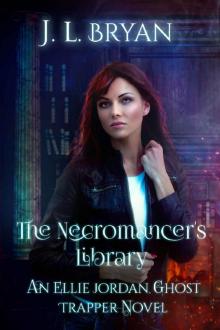 Ghost Trapper 12 The Necromancer's Library
Ghost Trapper 12 The Necromancer's Library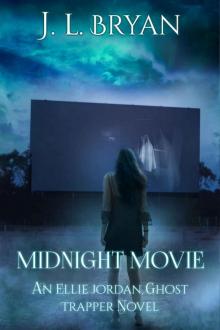 Ghost Trapper 14 Midnight Movie
Ghost Trapper 14 Midnight Movie_preview.jpg) Fairy Metal Thunder (Songs of Magic, Book 1)
Fairy Metal Thunder (Songs of Magic, Book 1)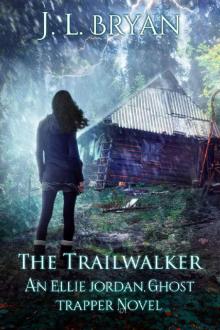 Ghost Trapper 13 The Trailwalker
Ghost Trapper 13 The Trailwalker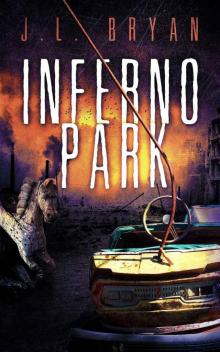 Inferno Park
Inferno Park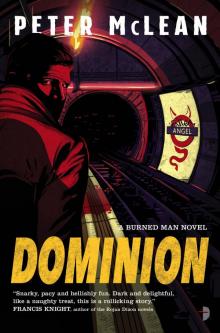 Dominion
Dominion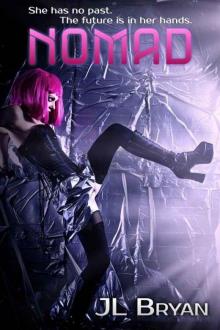 Nomad
Nomad The Tower (Ellie Jordan, Ghost Trapper Book 9)
The Tower (Ellie Jordan, Ghost Trapper Book 9) Jenny Pox (The Paranormals, Book 1)
Jenny Pox (The Paranormals, Book 1)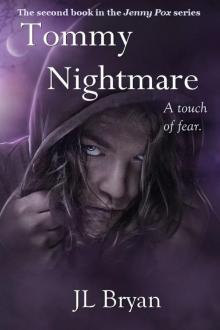 Tommy Nightmare (Jenny Pox #2)
Tommy Nightmare (Jenny Pox #2)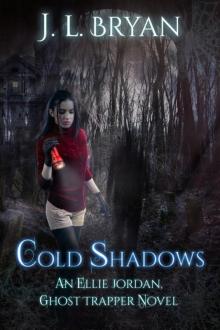 Cold Shadows (Ellie Jordan, Ghost Trapper Book 2)
Cold Shadows (Ellie Jordan, Ghost Trapper Book 2)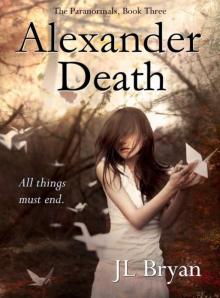 Alexander Death (The Paranormals, Book 3)
Alexander Death (The Paranormals, Book 3)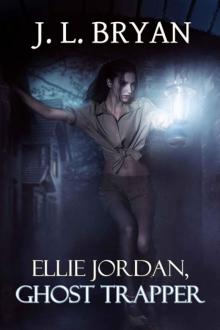 Ellie Jordan, Ghost Trapper
Ellie Jordan, Ghost Trapper Lullaby (Ellie Jordan, Ghost Trapper Book 7)
Lullaby (Ellie Jordan, Ghost Trapper Book 7) EJ06 - Maze of Souls
EJ06 - Maze of Souls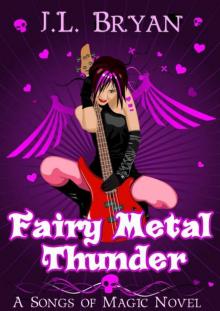 Fairy Metal Thunder (Songs of Magic, #1)
Fairy Metal Thunder (Songs of Magic, #1)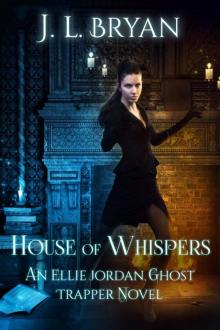 House of Whispers (Ellie Jordan, Ghost Trapper Book 5)
House of Whispers (Ellie Jordan, Ghost Trapper Book 5) Terminal (Ellie Jordan, Ghost Trapper Book 4)
Terminal (Ellie Jordan, Ghost Trapper Book 4) Jenny Pox
Jenny Pox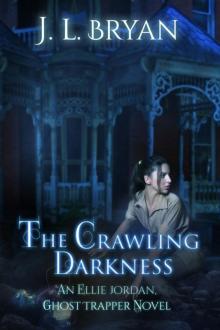 The Crawling Darkness (Ellie Jordan, Ghost Trapper Book 3)
The Crawling Darkness (Ellie Jordan, Ghost Trapper Book 3)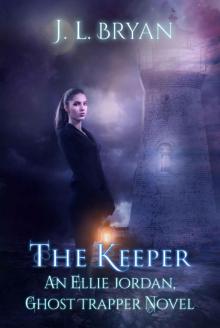 The Keeper (Ellie Jordan, Ghost Trapper Book 8)
The Keeper (Ellie Jordan, Ghost Trapper Book 8)